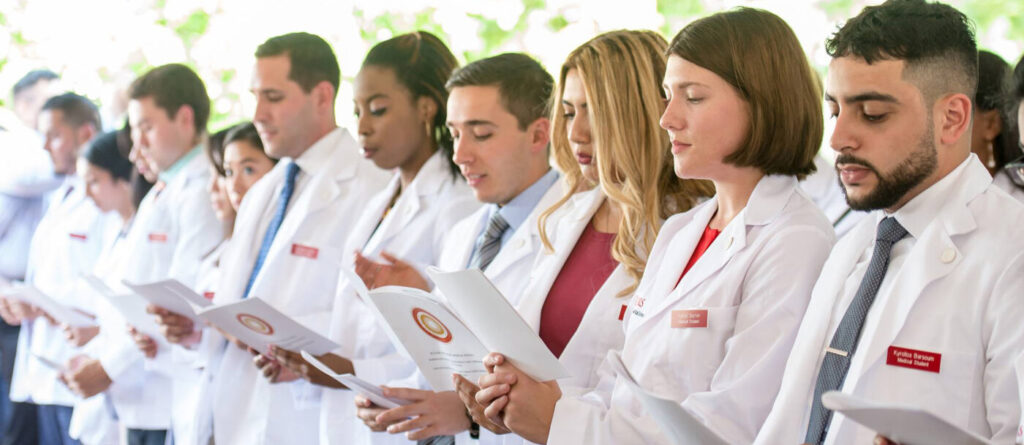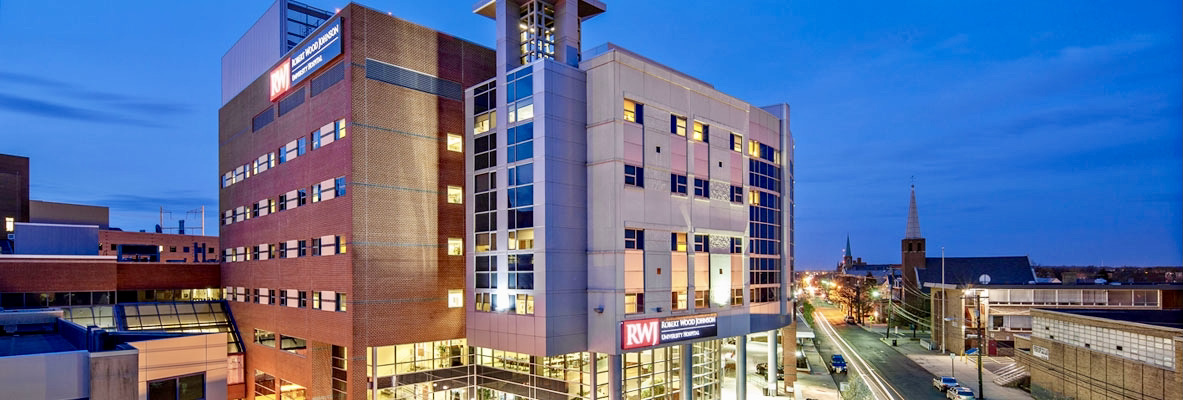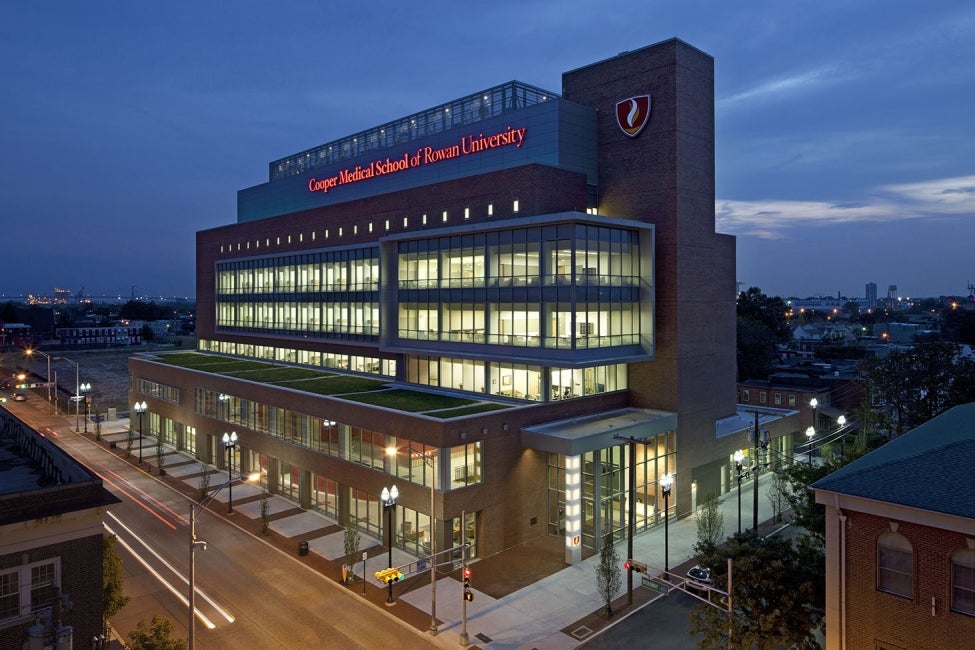Regarded by many to be the best medical school in New Jersey, the Rutgers New Jersey Medical School is a regional research powerhouse that offers its students unique service-learning opportunities and special degree programs such as an accelerated 3-year MD and distinctions in Public Health and Entrepreneurship and Innovation.
Whether you’re a New Jersey resident looking for the “best medical schools near me!”, or an out-of-state applicant interested in the NJMS’s unique programs and innovative curriculum, this guide will teach you everything you need to know about getting into Rutgers New Jersey Medical School.
Be an Informed Applicant
Every medical school has distinct characteristics that set it apart from the rest, and Rutgers New Jersey Medical School is no different. Before you begin planning your application strategy, it’s important to take the time to learn about what NJMS values in its students.
This guide organizes key information about NJMS for applicants, including an in-depth discussion of the school’s 2022-2023 secondary application. But nothing beats one-on-one guidance. International Medical Aid’s medical school admissions consulting helps you with everything from the details of your application to developing an overall strategy. We’ve helped thousands of students get into top medical schools across the country by understanding the unique strengths and weaknesses of each applicant. We know what it takes to stand out, so please reach out to us to find out how we can help you put your best foot forward.
This article contains:
- Why Rutgers New Jersey Medical School?
- Rutgers NJMS School Ranking
- MD Program at Rutgers NJMS
- Distinction Programs and Dual Degrees
- Research at Rutgers New Jersey Medical School
- Selection Factors: What Rutgers NJMS Looks for in a Candidate
- Admissions Requirements
- Admissions Statistics
- AMCAS Primary Application and Rutgers NJMS Secondary Application
- Rutgers NJMS Secondary Application: Essay Prompts, Sample Answers, and Advice
Why Rutgers New Jersey Medical School?
Rutgers NJMS is named the Best Medical School in New Jersey by publications such as Will Peach MD and The College Gazette. Located in Newark, the school is known for being the oldest medical school in New Jersey. Rutgers NJMS engages students in numerous community initiatives and opportunities for advanced biomedical research. It’s one of the most diverse medical schools in the country, and its student organizations and support offices reflect that.
University Hospital in Newark is NJMS’ primary teaching hospital. It’s the busiest level-1 trauma center in the state, and it’s also a regional center for neurosurgical intensive and care stroke care as well as a national hub for liver transplants. Students have the opportunity to work with patients from all over the country who come to University Hospital for its specialized services.
Rutgers NJMS graduates are highly sought-after by residency programs. In fact, more than 95% of students who apply to residency programs are accepted. The school has a strong reputation in both primary care and specialty medicine, and its graduates go on to successful careers in a variety of fields.
New Jersey pre-med students who ask, “What are good medical schools near me?” will often hear of NJMS’s accelerated 3-year MD program and other unique program opportunities as well as the school’s rich history of providing medical education to physicians across the region.
Rutgers NJMS School Ranking
U.S. News and World Report ranks Rutgers New Jersey Medical School:
- #74 in Best Medical School: Research
- #94 in Best Medical School: Primary Care
- #22 in Most Diverse Medical School
- #94 in Most Graduates Practicing in Medically Underserved Areas
- #142 in Most Graduates Practicing in Primary Care Fields
- #154 in Most Graduates Practicing in Rural Areas
MD Program at Rutgers NJMS
This section organizes key information about the MD program at NJMS, including its curriculum, special programs, dual degree options, and research opportunities.
Curriculum
The MD curriculum at NJMS was reworked in 2015 to focus on four themes:
- Profesional development with a healthcare team focus
- Service learning
- Early clinical practice
- Organ systems-based curriculum
Medical students at New Jersey Medical School engage in numerous interactive learning experiences throughout the curriculum. Some of the new teaching methods include large group discussions via an Audience Response System, e-learning modules, small-group clinical sessions using simulation and standardized patients, podcasts, flipped classrooms, and team-based learning.
The MD curriculum is delivered longitudinally as well as in three distinct phases. Phase one introduces learning experiences in Healing, Humanism, and Health Equity and the Core Biomedical Curriculum. Phase two introduces clerkships and early elective opportunities. Phase three provides fourth-year students with plenty of time to pursue electives, internships, and other experiences that assist in the specialization.
Community Engaged Service Learning (CESL)
The CESL electives consist of numerous structured service activities that impart knowledge of community needs and the civic responsibilities of healthcare workers.
Some examples of past services include:
- HIV education and prevention workshops
- Creating cookbooks with healthy recipes for families to try at home
- Blood pressure, glucose, and vision screenings at local churches
- Health conferences for community leaders
- Mentoring local students
- Health education sessions for young mothers
The school’s Student Family Health Care Center was established in 1967, making it one of the earliest student-run clinics in the U.S. The clinic serves medically underserved members of the Newark community.
Distinction Programs
NJMS offers MD students the opportunity to graduate with Distinction in Research, Service, Urban Health, Global Health, Entrepreneurship and Innovation, or Medical Education.
The Distinction Programs supplement the core MD curriculum and include a Capstone Project, experiential learning, mentorship, and interactive didactic sessions. The program is undertaken throughout the four-year MD program.
Accelerated 3-Year Primary Care MD Program
Students accepted to Rutgers New Jersey Medical School can apply for the school’s accelerated 3-year MD program. The program accepts students committed to pursuing primary care professions and offers conditional acceptance into the following Rutgers-sponsored residencies: Internal Medicine, Combined Internal Medicine/Pediatrics, or Pediatrics.
Dual Degrees
The following MD dual degree programs are available at NJMS:
- MD/MBA – in collaboration with Rutgers Business School
- MD/MPH – in collaboration with Rutgers School of Public Health
- MD/PhD – in collaboration with Rutgers Graduate School of Biomedical Sciences
- MD with Thesis Program – an MD program with an extra year devoted to research, administered through the Office of the Senior Associate Dean for Research
Research at Rutgers New Jersey Medical School
Research at Rutgers NJMS is conducted by highly motivated research faculty and utilizes advanced biomedical technology and facilities.
This New Jersey medical school has received over $150 million in recent funding from the National Institutes of Health for research projects, equipment, and programs.
NJMS excels in five areas of biomedical research: Brain Injury and Stroke, Cancer Oncology, Cardiovascular Biology, Immunology and Infectious Diseases, Neurosciences, and Stem Cells and Regeneration.
Faculty at NJMS are involved in numerous ongoing research efforts that contribute to the medical science community, such as Marcela Rodriguez and her lab’s work on the role of metal homeostasis in pathogenesis of tuberculosis.
Selection Factors: What Rutgers NJMS Looks for in a Candidate
Excelling academics, compelling clinical experiences, meaningful volunteer efforts, informative letters of recommendation, and impactful secondary essay responses are highly valued by medical schools across the country.
However, each school’s admissions faculty also looks for students who will be a good “fit” with their institution. Rutgers aims to enroll students who understand and appreciate the school’s mission and are uniquely positioned to contribute to the NJMS community.
Like many medical schools, the Office of Admissions at Rutgers New Jersey Medical School utilizes a holistic evaluation process. This means that they consider all aspects of an applicant’s file when making admissions decisions and evaluate the applicant as a whole.
The Office of Admissions evaluates applicants based on the following criteria:
- Broad extracurricular experiences
- Motivation for pursing medicine
- Ability to navigate challenges
- Demonstrated compassion for others
- Integrity
- Leadership qualities
- Self-awareness
- Validation of decision to pursue medicine
- Interpersonal characteristics
- Academic performance (MCAT scores, trend in grades, academic load, difficulty of coursework, GPA)
When applying to Rutgers NJMS, keep this list handy. As you fill out your application and prepare for interviews, reflect on how your experiences have helped you to grow in these areas and which academic, personal, and professional accomplishments demonstrate these competencies.
Admissions Requirements
Applicants must be citizens or permanent residents of the U.S. and complete three years at an accreditated undergraduate institution to apply. Students must complete a bachelor’s degree before matriculation.
Application Timeline
Rutgers NJMS accepts rolling submissions. You should submit your application and supporting materials as early as possible. Here are the application deadlines:
- Early Decision: August 1st
- Early Decision Supporting Materials: September 1st
- MD and Dual Degree Application: December 1st
- Secondary Application: December 15th
- Letters of Recommendation: December 15th
Required Coursework
Candidates must complete the following courses to apply:
- Biochemestry: one semester
- General Physics (with lab): two semesters
- Organic Chemistry (with lab): two semesters
- General Chemistry (with lab): two semesters
- General Biology (with lab): two semesters
- English/Writing Course: two semesters
Coursework in Genetics and Mathematics is also strongly recommended.
Letters of Recommendation
The Office of Admissions at Rutgers NJMS prefers a pre-health committee recommendation. If your undergraduate institution does not have a pre-health committee, you must submit three letters of recommendation: two from science faculty and one from non-science faculty.
A good letter of recommendation will include:
- An assessment of your academic abilities in the sciences
- A assessment of your clinical and/or research experience
- A discussion of your motivation for a career in medicine
- Your moral character
- How well the recommender knows you
GPA and MCAT Score
NJMS does not have a minimum required GPA or MCAT score. MCAT scores from exams taken before September of the year before matriculation are accepted.
NJMS Admissions Statistics
Here are some statistics on NJMS admissions (class of 2025) to help give you a better idea of how competitive the application process is.
Applicants:
- Total applicants: 6,751
- New Jersey applicants: 1,739
- Out-of-state applicants: 4,643
- Applicants underrepresented in medicine: 1,217
Interviews:
- Total interviews: 738
- New Jersey resident interviews: 447
- Out-of-state applicant interviews: 291
- Interviewees underrepresented in medicine: 168
Matriculation:
- Total enrolled applicants: 178
- New Jersey residents accepted and enrolled: 174
- Out-of-state applicants accepted and enrolled: 31
- Applicants underrepresented in medicine accepted and enrolled: 168
Class of 2025 GPA and MCAT:
- Average GPA: 3.7
- Average MCAT: 513
The Rutgers New Jersey Medical School acceptance rate is 6.6% and has been as high as 8% in recent years.
AMCAS Primary Application and Rutgers NJMS Secondary Application
Your application to Rutgers New Jersey Medical School will consist of two applications, a primary and a secondary. NJMS, like most allopathic medical schools, uses the American Medical College Application Service (AMCAS) for the primary application.
The first step is to complete your AMCAS primary application. Your AMCAS is then sent to each medical school you are applying to. Once these medical schools receive your AMCAS application and confirm that you meet the minimum requirements, you will be invited to complete a secondary, school-specific application.
The AMCAS is just the first step, but it’s an important one. For tips on how to complete your AMCAS primary application, check out our article 10 Most Common Mistakes to Avoid on Your AMCAS Application.
The secondary application usually consists of essay prompts and a few multiple-choice or short-answer questions. These questions are crafted by the medical school’s admissions staff and are designed to help the school learn more about you as a person and potential student.
If you’d like a more detailed read on primary and secondary applications, see our article, Primary vs. Secondary Applications: Understanding the Differences.

Rutgers NJMS Secondary Application: Essay Prompts, Sample Answers, and Advice
Your secondary essay is a crucial opportunity to demonstrate what makes you uniquely qualified to attend NJMS. While your primary application gives the admissions staff basic information about you, your secondary essay is where you can really shine and tell them what sets you apart from other applicants.
When writing your responses, there are a few things to keep in mind.
Brainstorm before you start writing. Take out a pencil and paper and write down anything the prompt makes you think of. This will help you organize your thoughts and make sure you don’t forget anything important. From here, you can start to structure your essay and decide what you want to say.
Ground your responses with concrete examples Whenever possible, support your claims with real-life examples. This will make your essay more convincing and memorable to the admissions staff. By demonstrating who you are through specific stories and experiences, you’ll give the admissions committee a much clearer sense of who you are and how you’ll contribute to the NJMS community.
Be thoughtful and honest. This is your opportunity to let the admissions staff get to know you better, so don’t be afraid to share your story. But make sure you’re being thoughtful about what you’re sharing and why it’s important.
Be specific. When you’re writing about yourself, it can be tempting to try to include everything, but it’s important to be specific and focus on a few key points that will really show who you are and what you can bring to the table. While broad statements can be important to contextualize your response, they shouldn’t be the focus of your essay.
Edit, edit, edit. Once you’ve finished writing, put your essay away for a little while and come back to it later with fresh eyes. This will help you catch any errors or awkward phrasing you might have missed the first time around. It’s also a good idea to have someone else read your essay to get another perspective.
With these tips in mind, let’s take a look at the secondary essay prompts for Rutgers NJMS.
These prompts are from the 2022-2023 application cycle. Each response is limited to 1500 characters.
Essay #1
We are committed to an environment which fosters collaboration, humanism, equity and social justice. How do you envision yourself contributing to the NJMS community?
This essay prompt is asking you to talk about how you see yourself fitting into and contributing to the NJMS community. When thinking about your response, consider what unique perspectives or experiences you can bring to the table and how you can use them to enhance the community at NJMS.
Specifically, the prompt lists collaboration, humanism, equity, and social justice. These are all important values at NJMS, so make sure to address how you see yourself promoting these ideals within the community. To start, think of times you’ve demonstrated these qualities. Use real-world examples related to academics, medicine, service, leadership, or research to illustrate your points.
For example, perhaps you’re passionate about promoting equity in healthcare. You can talk about how you see yourself working to close the healthcare disparities that exist in our society. Maybe you have personal experience with this issue, or maybe you’ve seen it firsthand during your clinical experiences. Use these examples to highlight why this issue is important to you and how you plan on making a difference at NJMS.
The best way to answer this prompt will depend on your experiences. Here are some ideas to get you thinking:
- Research: If you want to highlight your research experience, you can use examples of collaboration and humanism. For example, you can talk about how your research has been driven by a desire to help others or solve a real-world problem. You can also discuss how your research has involved working with people from different backgrounds and disciplines, which has helped you develop important teamwork skills.
- Clinical experiences: If you want to focus on your clinical experiences, you can discuss how they’ve shaped your view of medicine and patient care. For example, you can talk about a time when you witnessed inequality in healthcare and how that motivated you to become a doctor. You can also discuss how working with patients from diverse backgrounds has helped you develop empathy and compassion, which are essential qualities for any physician.
- Service: If you want to focus on your service experiences, you can talk about how they’ve helped you develop a commitment to social justice, collaboration, and humanism. For example, you can discuss how working with underserved populations has made you aware of the structural inequalities that exist in our society. You can also talk about how your service experiences have helped you develop teamwork skills and a practical connection with humanist values.
- Leadership: If you want to focus on your leadership experiences, you can talk about how they’ve helped you develop important qualities like collaboration and social justice. For example, you can discuss a time when leading a team helped you develop a deep respect for others and a commitment to working collaboratively. You can also talk about experiences where you had to stand up for what was right, even in the face of adversity, which has helped you develop a strong sense of social justice.
- Academics: If you want to focus on your academic experiences, you can talk about how collaboration has helped you learn or how humanist values motivate you to be knowledgeable in the field of medicine. For example, you can discuss a time when a collaborative learning environment helped you achieve academic success. Additionally, you could talk about a self-directed learning project that was driven by a desire to help others.
Remember, this is just a starting point. The best way to answer this prompt will be to focus on your own experiences and how they’ve shaped what you’re able to bring to the table. Regardless of how you decide to answer this prompt, make sure to open and close with a confident statement explaining how you envision yourself contributing to the NJMS community.
Essay #2
We seek students who are self-aware, resilient and adaptable. Discuss a personal or professional challenge you’ve experienced and how you resolved it. Please include insight on what you learned about yourself as a result.
This prompt is asking you to discuss a time when you faced a challenge and how you coped with it — and, most importantly, how you grew from the experience. The admissions committee wants to see that you’re capable of overcoming adversity and learning from setbacks. They also want to see that you have some self-awareness and can reflect on your experiences in a meaningful way.
To start, think of…
- A time when you had to confront your own biases or assumptions
- A time when you failed and what you did to pick yourself up afterward
- A time when you had to overcome a significant obstacle
- A time when you had to step outside of your comfort zone
- A time when you had to deal with a difficult situation or person
- A time when you had to adapt quickly to changing circumstances or new information
The prompt asks for responses about “personal” or “professional” challenges. However, you can really draw on any type of experience — from your academic life, extracurriculars, volunteering, family life, etc. Just make sure to focus on a time when you faced some sort of adversity and how you responded to it.
Once you’ve identified a challenge that you want to write about, it’s time to start structuring your essay. In your introduction, give some background on the situation and explain what the challenge was. Then, in the body of your essay, discuss how you coped with the challenge and what you learned from the experience. Finally, in your conclusion, reflect on what this experience has taught you about yourself and how it will help you in your future endeavors — both personal and professional.
Ideally, your response will include experiences relevant to the study and profession of medicine. However, you can really write about any type of challenge as long as you’re able to reflect on it in a meaningful way and connect it to why you will succeed in medical school and a career in medicine.
In the sample essay below, the applicant faces the challenge of burn-out and lack of motivation. They overcome this challenge by reaching out to friends and family, establishing a healthy work/life balance, and being open to new experiences.
I remember the day I hit my breaking point. I was burned out, exhausted, and completely unmotivated. I had been working, studying, and volunteering tirelessly for months on end, and it was all starting to feel like too much. I was second-guessing my decision to pursue medicine and questioning whether I was cut out for this profession.
I reached out to my friends and family for support and they all said the same thing: “find ways to relax.” Though I wasn’t sure what to do at first, my brother began taking me on his weekend hikes. The peace of nature was surprisingly rejuvenating. I became fascinated by the power of nature to relax our minds, which inspired me to undertake a semester project on Attentional Restoration Theory.
My time in nature did more than simply recharge me. It gave me the peace I needed to comfortably take a step back from my pre-med grind and consider my options in terms of what I truly wanted to be doing. After a few weeks of hiking with my brother, I realized I wanted to see the world, learn about new cultures, and understand what healthcare means in a global context.
I decided to change my summer plans and pursue a pre-med shadowing study abroad program with International Medical Aid. This experience completely changed my outlook on medicine. I was able to see firsthand how different cultures approached medicine and gained a broader, deeper understanding of the power of compassion and resiliency in healthcare.
Before all this, I was truly on the cusp of giving up. I learned that friends and family can be great sources of support. I also learned that there is so much more to medicine than the academic side of things — there’s the human side, too. This experience reaffirmed my desire to pursue medicine and showed me that I can overcome stress and hopelessness. I understand now that spending time in nature can quite literally change your life, because without the space and peace to assess our paths, we can’t possibly know which way to go.
Essay #3
If you will not be a full-time student between June 2022 and August 2023, please describe in detail your planned activities, including projected time commitment for each activity.
It’s increasingly common for medical students to take a gap year before attending medical school. This can be for a variety of reasons, from pursuing more clinical experiences to wanting to take a break before embarking on such a demanding journey.
If you’re planning on taking a gap year, or even just a few months off, it’s important to be thoughtful about how you’ll spend your time. This essay prompt gives you the opportunity to explain what you’ll be doing during your time off and how it will contribute to your development as a medical student and future physician.
For example, you might use your time off to:
- complete more clinical experiences or research hours
- travel and learn about healthcare in different cultures
- take post-bac coursework in a related field (e.g., public health)
- spend time with family or save money
- develop your non-clinical skills, such as writing and public speaking
- follow through on professional, volunteer, or personal commitments.
Be sure to detail how your activities will help you grow as a person and develop into the type of physician you hope to be. Admissions committees want to see that you’re using your time off wisely and that you have a plan for how you’ll contribute to the medical profession.
However, for this question, focus on thoroughly communicating the details of your gap year activities. The next question gives you an opportunity to explain any time off you’re taking between graduation and medical school.
If you’re planning to take a gap year but are not sure how to spend your time, consider reaching out to our expert medical school admissions consultants. We know what makes for a great medical school application and have helped thousands of pre-med students just like you get into top schools across the country. Whether it’s a pre-med shadowing study abroad program or medical school admissions consulting, we can help you make the most of your gap year and get into the school of your dreams!
Essay #4
If you have chosen to pursue one or more “growth” years prior to your planned matriculation to medical school in 2023, please share insight on your decision.
Similar to the third prompt, this question asks about any time you’ve taken off between college and medical school. However, this question specifically asks for insight into your decision to take time off.
How you approach this question will depend on your circumstances. How will you/have you spent your time after graduation?
Take a moment to brainstorm your response to this question. Why did you decide to take time off before medical school? What did you hope to gain from the experience? How do you think it will contribute to your development as a physician?
Your answer to this question can be personal or professional, but it should provide insight into your motivations for taking time off and how that time will help you develop as a medical student and future doctor.
Essay #5
If you are a re-applicant, please share what you have done to enhance your candidacy and re-application?
Many, many medical school applicants don’t get into medical school the first time around. Even the most qualified candidates are turned away due to limited capacity. In fact, in recent years, about a quarter of medical school applicants are applying for a second or third time. The good news is that medical schools understand this, and they are often very receptive to reapplicants.
This question gives you an opportunity to address any weaknesses in your application and explain what you’ve done to improve your candidacy since you last applied.
For example, if you didn’t do so well on the MCAT the first time around, you might have retaken the exam and gotten a better score. Or, if your GPA was on the lower end, you may have taken some post-bac coursework to raise your GPA.
Whatever the case may be, be sure to address any weaknesses in your application head-on. Don’t try to gloss over them or make excuses. Be honest, and explain what you’ve done to improve your candidacy.
Essay #6
Please elaborate on challenges not thoroughly addressed anywhere else in your application (Please feel free to address any or all of the following if applicable: impact of COVID, institutional actions, academics, MCAT, personal difficulties, etc.).
This question is pretty straightforward. It allows you to elaborate on any challenges that haven’t been addressed elsewhere in your application. These could be anything from the impact of COVID-19 to personal difficulties you’ve faced.
If you choose to address a challenge like COVID-19, be sure to focus on how it has impacted you specifically. What changes have you had to make in your life? How has it affected your academic or professional goals?
However, if there are any discrepancies or problems in your application, you should focus your response on those. Downward GPA trends, for example, can be addressed here. You can also provide context for any difficult personal or family circumstances that may have impacted your academic performance. Maybe you missed out on planned pre-med experiences that resulted in a thin work and activities section. Whatever the case may be, this is your opportunity to provide context and explanation for anything that might be seen as a weakness in your application. Remember, context is important, but what you learned from the experience and what you did to remedy any setbacks is even more so.
Whatever you choose to address in this essay, be sure to focus on how you’ve overcome the challenge and what you’ve learned from it. This is an opportunity to show admissions committees that you’re resilient and capable of overcoming obstacles.
Essay #7
Please discuss any additional information you feel may help us in our review of your candidacy.
So far, the NJMS secondary application has given applicants ample space to share their stories and explain their motivations for becoming a doctor. This final question is your opportunity to provide any additional information that you feel hasn’t been adequately addressed in your application.
You can add additional information or elaborate on something you’ve already mentioned but didn’t cover completely. For example, maybe you come from an underrepresented background and want to share how that has shaped your experiences and your desire to become a doctor. Perhaps you mentioned a pre-med internship but didn’t have enough space to talk about what you did or what you learned. This is your chance to fill in any gaps and give the admissions committee a more well-rounded picture of who you are as an applicant.
This question is also your opportunity to address anything that may have come up after you submitted your primary application. Maybe you got a new job or took on a leadership role in an extracurricular activity. Maybe you received an award or did some volunteer work that you didn’t have space to mention elsewhere. Whatever the case may be, this is your chance to share any new information about yourself that you feel would be helpful for the admissions committee to know.
Finally, this question allows you to elaborate on your long-term goals and how NJMS can help you achieve them. Why do you want to attend NJMS? What do you hope to accomplish as a doctor? Be specific and share concrete examples of how you plan to make an impact in your future career.
Before you start writing, read through your other essay responses. Take moment to brainstorm about everything that makes you a unique and qualified candidate. What else do you want the admissions committee to know about you? Your application should cover your motivations for pursuing medicine, your plans for your future career, impactful clinical and volunteering experiences, why you want to attend NJMS specifically, and anything else that you think would be helpful for the admissions committee to know. Once you have a list of potential topics, choose the one that you feel is most important or will paint the clearest picture of who you are as an applicant.
Good Luck to You!
Completing the NJMS secondary application is a crucial step in the medical school admissions process. By taking the time to thoughtfully and carefully respond to each of the essay prompts, you’ll give yourself a much better chance of being invited to interview and ultimately offered admission to NJMS.
We hope this guide has provided you with the information and resources to build a strong application for NJMS. Make sure to check out the rest of our definition medical school guides:
- Rutgers Robert Wood Johnson Medical School
- Cooper Medical School of Rowan University (CMSRU)
- A.T. Still University Kirksville College of Osteopathic Medicine
- Saint Louis University School of Medicine
- University of Missouri Medical School
- Kansas City University (KCU)
- UMKC School of Medicine
- New York Medical College
- University of Pittsburgh School of Medicine
- University of Wisconsin Medical School
- VCU School of Medicine
- University of Maryland School of Medicine
- Case Western Medical School
- University of North Carolina Medical School
- University of Florida Medical School
- Emory University School of Medicine
- Boston University College of Medicine
- California University of Science and Medicine
- UC San Diego Medical School
- California Northstate University College of Medicine
- Touro University of California
- CHSU College of Osteopathic Medicine
- UC Davis School of Medicine
- Harvard Medical School
- UC Riverside School of Medicine
- USC Keck School of Medicine
- UT Southwestern Medical School
- Long School of Medicine at UT Health San Antonio
- University of the Incarnate Word School of Osteopathic Medicine
- UT Austin’s Dell Medical School
- UTMB School of Medicine
- McGovern Medical School at UT Health
- Johns Hopkins School of Medicine
- McGovern Medical School at UT Health
- The University of Texas Rio Grande Valley School of Medicine
- UNT Texas College of Osteopathic Medicine
- University of Houston College of Medicine
- Texas A&M College of Medicine
- Johns Hopkins Medical School
- Baylor College of Medicine
- George Washington University School of Medicine
- Vanderbilt University School of Medicine
- St. George’s University School of Medicine
- Lake Erie College of Osteopathic Medicine (in Pennsylvania)
- Sidney Kimmel Medical College at Thomas Jefferson University
- Wake Forest University School of Medicine
- Western University of Health Sciences (in California)
- Drexel University College of Medicine
- Stritch School of Medicine at Loyola University Chicago
- Georgetown University School of Medicine
- Yale School of Medicine
- Perelman School of Medicine
- UCLA Medical School
- NYU Medical School
- Washington University School of Medicine
- Brown Medical School
We wish you the best of luck on your journey to becoming a physician! Please reach out to us with any questions, big or small.






